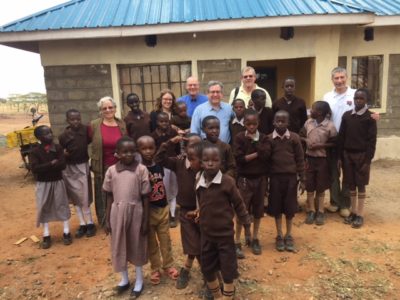Children at Lenkishon
Project 24 report by Kissinger Nyang’au
OVERALL 2016 PROJECT GOALS
- Children are brought into contact with the Lutheran Church through Catechesis, Bible study, and daily Matins and Vespers.
- Through the children in the project, the Lutheran Church gains access to their family, guardians, and the surrounding community for the sake of the Gospel.
- Children are fed well and are in a stable environment so that this enables them to focus on their studies.
- Children successfully complete primary, secondary school and college/university
- Guardians and the local congregation participate and make a contribution to the children by providing school uniforms, books, exercise books, and pencils.
2016 PROJECT OBJECTIVES
- Children in all project 24 sites should be able to recite and memorize Luther’s Small Catechism and attend the catechism club twice a year.
- By the use of P24 sites, the ELCK shall spread the Gospel to the children’s families and the community at large.
- The children’s basic needs are met and conducted in a child friendly environment.
- Create and develop a child sponsorship program named Christ Care for Children: Kenya. (CCC: K).
- Foster project communal participation, ownership, sustainability through networking.
- Enhance education performance.
- Promote teamwork within the leadership
- Enhance and reinforce financial procedures
- Create a new system of governance
HIGHLIGHTS OF 2016
NEW FINANCIAL PROCEDURES
Within 2016, the LCMS developed a financial funding path to enable smooth financial communication channels from OIM, LCMS, ELCK, the local Dioceses and finally to every P24 site. On the 15th of every month, LCMS initiates funds to the ELCK designated fund. The money is then received by the ELCK which in turn is sent to each of the sites. Upon receiving the funds, the site managers together with their relevant boards send their financial cash flows with evidence of bank statements, expenditure receipts, cash at bank and cash at hand. This practice demonstrates accepted standards of financial methods. To enhance this practice, the Project 24 stakeholders meet once a year for a State of P24 Forum. This forum creates an opportunity for all project stakeholders to learn from each other with an aim of perfecting the project.
On 19th February 2016, all stakeholder’s members met at P24 Othoro for a shared forum which provided an opportunity for the financial issues to be discussed openly. Financial Statements were prepared in accordance with the LCMS accepted standards. Statements of their income and expenditures helped us track the movements of each individual boarding facility. Audited accounts per every site were conducted on June 2016 to check on the Project 24 balance sheets. Detailed financial notes in terms of receipts and bank statements were received and filed in our office filing systems.
Overall, the LCMS’s principles of accountability has enhanced our program and all of the P24 sites are accountable for financial expenditure for the entire projects development.
GOVERNANCE
The steering committee has been properly governing the project this last year.
The steering committee members are:
- The ELCK National Director of Development or representative
- The ELCK General Secretary or representative
- The LCMS Project24 Director
- The LCMS Regional Project Manager or representative
- The LCMS Area Director for Eastern and Southern Africa or representative
Each member of the committee has various responsibilities of managing the project. The committee oversees the strategic direction of Project 24 and the steps taken to ensure that the program is directed towards its goals and objectives. The ELCK is structured in a way that delegates responsibilities from the Head office, to the dioceses, to the parishes and finally to the P24 project sites. Steps are taken to supervise and delegate this project structure. Unfortunately, there is a gap in this organization structure. This challenge needs to be addressed by ELCK management team.
The steering committee developed many initiative activities such as: securing new income streams, raising the public profile of the organization, project marketing, and acquiring new facilities. They lead as examples by demonstrating transparency, accountability and team building. They communicate the project’s commitment to the best practice in the project’s policy statements.


